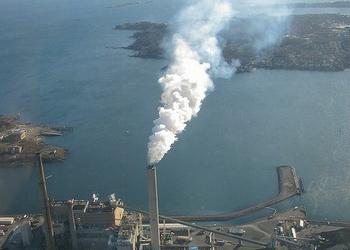
WASHINGTON, DC, December 14, 2012 (ENS) – Under a court order, the U.S. Environmental Protection Agency today finalized an update to its national air quality standards for harmful fine particle pollution (PM2.5), including soot.
The agency set the new annual health standard at 12 micrograms per cubic meter of air. The new standard is stricter than the previous standard of 15 micrograms, set in 1997.
The EPA’s stricter soot limits are a result of litigation filed by the American Lung Association along with the National Parks Conservation Association, resulting in a federal court order requiring the EPA to issue updated standards for particle pollution.

The new standard takes into consideration the latest science and medical research, affirming that soot pollution must be limited because of its deadly health effects.
Fine particle pollution can penetrate deep into the lungs and has been linked to a wide range of serious health effects, including premature death, heart attacks, and strokes, as well as acute bronchitis and aggravated asthma among children.
“These standards are fulfilling the promise of the Clean Air Act. We will save lives and reduce the burden of illness in our communities, and families across the country will benefit from the simple fact of being able to breathe cleaner air,” said EPA Administrator Lisa Jackson.
“We know clearly that particle pollution is harmful at levels well below those previously deemed to be safe. Particle pollution causes premature deaths and illness, threatening the millions of Americans who breathe high levels of it,” explained Norman Edelman, MD, chief medical officer for the American Lung Association.
“By setting a more protective standard, the EPA is stating that we as a nation must protect the health of the public by cleaning up even more of this lethal pollutant,” said Dr. Edelman. “Reducing particle pollution will prevent heart attacks and asthma attacks, and will keep children out of the emergency room and hospitals. It will save lives.”
Today 66 counties in eight states do not meet the new standard, including the metropolitan areas of Los Angeles, Houston, St. Louis, Chicago, Cleveland and Pittsburgh.
By 2020, 99 percent of U.S. counties are projected to meet revised health standard without any additional actions, the EPA projects.
The EPA expects that fewer than 10 counties, out of the more than 3,000 counties in the United States, will need to consider any local actions to reduce fine particle pollution in order to meet the new standard by 2020, as required by the Clean Air Act.
All other counties can rely on air quality improvements from federal rules already on the books to meet this new standard.
The new standard leaves unchanged the existing daily standard for fine particles and the existing daily standard for coarse particles (PM10), which includes dust from farms.
By 2030, it is expected that all standards that cut PM2.5 from diesel vehicles and equipment alone will prevent up to 40,000 premature deaths, 32,000 hospital admissions and 4.7 million days of work lost due to illness.
Six senators, led by Orrin Hatch, a Utah Republican, wrote Jackson on Friday, deploring the new rule. “EPA should not rush at this time toward imposing more regulatory burdens on struggling areas,” the senators wrote.
The National Association of Manufacturers President and CEO Jay Timmons said the new standard will put undue burdens on manufacturers.
“With the fiscal cliff only a few weeks away and so much hanging in the balance, the EPA displayed a staggering level of shortsightedness by dropping another harsh regulation on America’s job creators,” Timmons said in a statement.
“This new standard will crush manufacturers’ plans for growth by restricting counties’ ability to issue permits for new facilities, which makes them less attractive for new business. Essentially, existing facilities will have to be shuttered for new facilities to be built in these areas,” Timmons said. “This is not a conducive way to create jobs.”
But environmental groups applauded what Michael Brune, executive director of the Sierra Club called “crucial, life-saving protections.”
“We now stand ready to join the Administration in vigorously defending the stronger soot limits from Congressional attacks that would seek to roll back this victory for public health,” Brune said. “We applaud the EPA for putting the health and safety of our children and families above polluter profits and corporate special interests.”
Copyright Environment News Service (ENS) 2012. All rights reserved.
© 2012, Environment News Service. All rights reserved. Content may be quoted only with proper attribution and a direct link to the original article. Full reproduction is prohibited.
